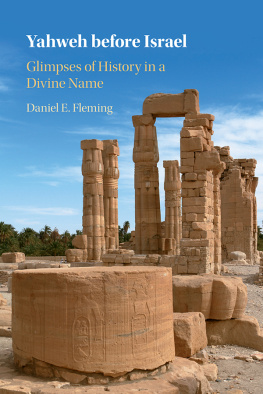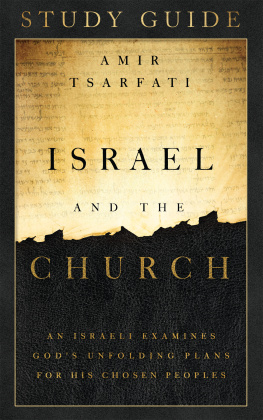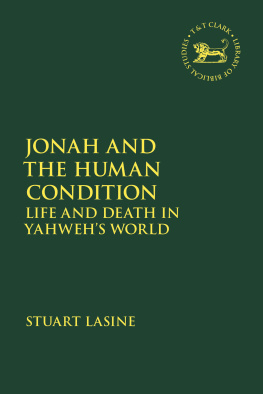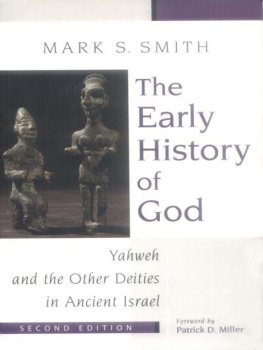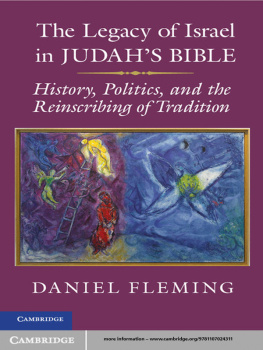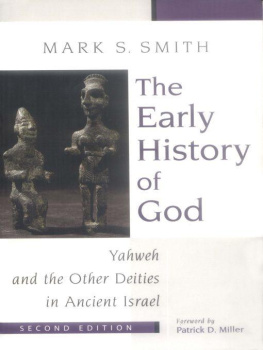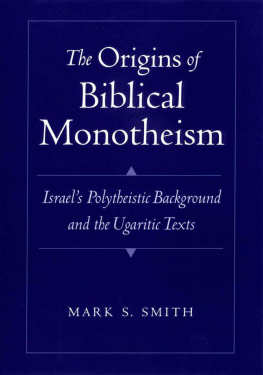Yahweh is the proper name of the biblical God. His early character is central to understanding the foundations of Jewish, Christian, and Islamic monotheism. As a deity, the name appears only in connection with the peoples of the Hebrew Bible, but long before Israel, the name is found in an Egyptian list as one group in the land of tent-dwellers, the Shasu. This is the starting point for Daniel Flemings sharply new approach to the god Yahweh. In his analysis, the Bibles people of Yahweh serve as a clue to how one of the Bronze Age herding peoples of the inland Levant gave its name to a deity, initially outside of any relationship to Israel. For 150 years, the dominant paradigm for Yahwehs origin has envisioned borrowing from peoples of the desert south of Israel. Fleming argues in contrast that Yahweh was not taken from outsiders. Rather, this divine name is evidence for the diverse background of Israel itself.
Daniel E. Fleming is Ethel and Irvin A. Edelman Professor of Hebrew and Judaic Studies at New York University. Along with other books and numerous articles, he is the author of Democracys Ancient Ancestors: Mari and Early Collective Governance and The Legacy of Israel in Judahs Bible: History, Politics, and the Reinscribing of Tradition.
Daniel E. Fleming
University Printing House, Cambridge CB2 8BS, United Kingdom
One Liberty Plaza, 20th Floor, New York, NY 10006, USA
477 Williamstown Road, Port Melbourne, VIC 3207, Australia
314321, 3rd Floor, Plot 3, Splendor Forum, Jasola District Centre, New Delhi 110025, India
79 Anson Road, #0604/06, Singapore 079906
Cambridge University Press is part of the University of Cambridge.
It furthers the Universitys mission by disseminating knowledge in the pursuit of education, learning, and research at the highest international levels of excellence.
www.cambridge.org
Information on this title: www.cambridge.org/9781108835077
DOI: 10.1017/9781108875479
Cambridge University Press 2021
This publication is in copyright. Subject to statutory exception and to the provisions of relevant collective licensing agreements, no reproduction of any part may take place without the written permission of Cambridge University Press.
First published 2021
A catalogue record for this publication is available from the British Library .
Library of Congress Cataloging-in-Publication Data
Names : Fleming, Daniel E., author.
Title : Yahweh before Israel : glimpses of history in a divine name / Daniel E. Fleming, New York University.
Description : Cambridge, United Kingdom ; New York, NY , USA : Cambridge University Press, 2021. | Includes bibliographical references and index.
Identifiers: LCCN 2020023805 (print) | LCCN 2020023806 (ebook) | ISBN 9781108835077 (hardback) | ISBN 9781108799614 (paperback) | ISBN 9781108875479 (epub)
Subjects: LCSH : God (Judaism)Name.
Classification: LCC BM 610 . F 55 2021 (print) | LCC BM 610 (ebook) | DDC 296.3/112dc23
LC record available at https://lccn.loc.gov/2020023805
LC ebook record available at https://lccn.loc.gov/2020023806
ISBN 978-1-108-83507-7 Hardback
Cambridge University Press has no responsibility for the persistence or accuracy of URLs for external or third-party internet websites referred to in this publication and does not guarantee that any content on such websites is, or will remain, accurate or appropriate.
for Mark Stratton Smith, my friend,
without whom my scholarly life would not be the same
and life generally far duller
Contents
Figures
Preface
My students and I have a running joke about speculation. I am against it, I say. New ideas, new possibilities, are essential, and uncertainty is unavoidable. We must learn to describe precisely what we propose, the evidence and arguments for it, along with the gaps and soft spots in the resulting interpretation. Speculation launches into unfounded guesswork, refusing the rigors of proof and disproof. This is not the same as identification of novel explanations, measured carefully against failed alternatives.
For all my determination to eschew speculation, the accusing word hangs over scholarly work as a plague waiting to infest it. When I took on Yahweh, the special god of the Hebrew Bible and ancient Israel, I entered a realm where ancient history and contemporary religion meet in a cacophony of convictions and conclusions. I offer my own, and their interest to me lies in their novelty, the hope that I have pushed down paths that will prove productive even to those with differing solutions. At every point in the discussion that follows, I will be elaborating what I perceive as a new framework for understanding the earliest evidence for Yahweh, even as I build on the work of others and try not to underplay the uncertainties.
I mean the last in specific terms. My acceptance of the notion that Yhw of the Shasu people in old Egyptian evidence reflects the same name as the famous god is widely shared but capable of valid doubt. My treatment of the opening hymn in the Song of Deborah (Judges 5) as a later elaboration began as an effort at caution, to avoid reading the name Israel as original to all the peoples of the battle account (vv. 1223) when the pattern of appearance suggested otherwise. Yet others make the equation without hesitation. These two interpretive choices are essential to the history I reconstruct here, and they are debatable from the start.
Yet I am determined to avoid speculation, and I hope that my interpretations and discussion are thought-provoking and as often as possible persuasive, worth the read, and worth having written. I begin my offering with this acknowledgment of what such an effort involves. My first higher education was in the natural sciences (geology), and I still carry with me the ideals of scientific pursuit. Progress is made by the construction of interpretations that are capable of testing and susceptible to improvement or disproof. There is no fixed destination, because reality always presents new questions with every conceptual advance. For all that readers may prefer certainties to probabilities, and solutions with alternatives may look like speculation, historical reconstruction always inhabits such conceptual space, the more so when peering at obscure first appearances. Possibilities and probabilities are what we have, and they warrant weighing. Through this work I will construct my argument with as much nuance and precision as I can muster, taking account of degrees of certainty along with what appear secure landmarks. It is my hope that readers will find my caution appropriate to the material and measured carefully, even where their own may lead them differently.
My ruminations on Yahweh before Israel build on generations of insightful study, and so far as they contribute to future work, they will themselves be corrected and improved. This is as it should be. These questions take us back to the hazy horizon of the evidence, where the available facts are well known and the issue is how to situate them in the expanse of what we do not know properly. With what follows I propose to rearrange these facts, convinced that the arrangement is new and interesting, plausible and yet tentative, calling for the reflection of others. It is this reflection to which you are invited.

